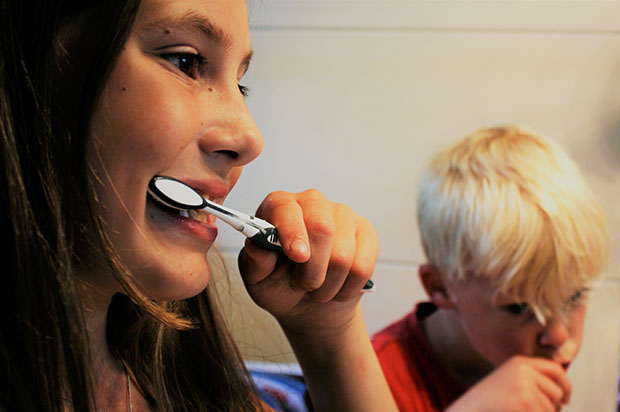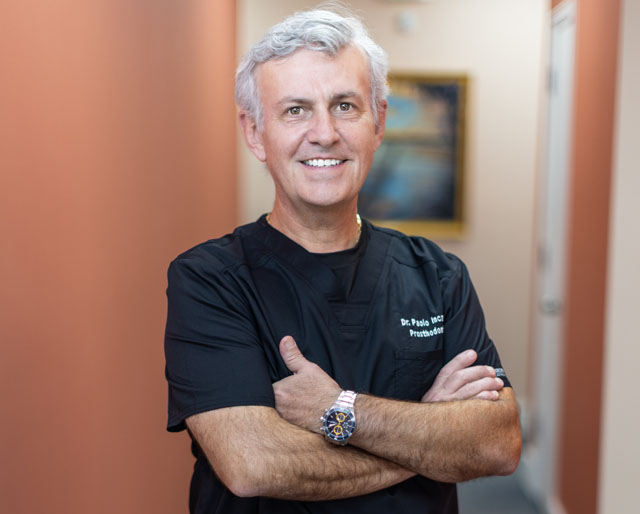Healthy Smiles Ahead
10 Sep 2021
Don’t Let Small Dental Problems Become Big Problems
By Brian Sherman

Most people can come up with dozens of reasons to avoid a trip to the dentist. Maybe they don’t have insurance that would cover what could be expensive dental work. It’s possible that they see no reason to visit the dentist if none of their teeth are hurting at the moment, or maybe they just feel uncomfortable having someone poking around inside their mouth. And, then, of course, there’s the pain they’re sure they will feel during and after their visit to their dental professional.
But seeing a dentist regularly can ease all those concerns. Potential dental problems are much easier to fix, much less expensive and a lot less painful to deal with when they are discovered in their early stages. And, according to the American Dental Association, “keeping your mouth healthy is an essential piece of your overall health.” In fact, some diseases and medical conditions produce symptoms that appear in the mouth, so it’s entirely possible that your dentist will recognize a problem that might affect a different part of your body.
“I tell everyone that the mouth and body are connected – they are not separate and distinct,” said Dr. Jason Annan, DDS, the owner of East Cooper Smiles in Mount Pleasant. “Problems in the mouth can be a harbinger for something more. It’s important to keep all parts of the body healthy.”
According to Matthew Barefoot, DDS, MD, a board-certified oral and maxillofacial surgeon with Oral Surgery & Dental Implant Specialists in Mount Pleasant, you should have regular dental checkups and cleanings every six months to keep your teeth and gums healthy. He urges his patients to continue regular visits to the dentist, even during the COVID-19 pandemic.
“Delaying any kind of dental work can potentially result in extensive procedures down the road and can be harmful to a person’s overall health,” he said.
There are several possible reasons to schedule an appointment in between your regular six-month teeth-cleaning sessions. According to the American Dental Association, you should have your dentist check things out if:
• Your teeth are sensitive to hot or cold
• Your gums bleed when your brush or floss
• You are having problems with fillings, crowns, implants or dentures
• You have persistent bad breath or a bad taste in your mouth
• Your mouth is often dry
• You notice pain or swelling in your mouth, face or neck
• You have a hard time chewing or swallowing
• Your jaw sometimes pops or is painful when opening or closing your mouth or chewing
• You have a spot or sore in your mouth that doesn’t look or feel right and doesn’t heal.
You might also need to maintain a regular schedule with your dentist if you are pregnant, you have a family history of gum disease or tooth decay, you are undergoing medical treatment such as radiation, chemotherapy or hormone replacement therapy, you suffer from a medical condition such as diabetes, cardiovascular disease or eating disorders or if you smoke or use other tobacco products.
With more persistent conditions, it’s recommended to see specialists. Periodontists, for example, have expertise in dental implants and treating gum disease. At Teeth Dentists & Specialists, with three locations in Charleston, owner Dr. Erin McKenzie is an endodontist, specializing in root canals and her husband, Dr. Luke Liszka is a periodontist whose expertise is in dental implants and gums.
Dental professionals agree that even if you don’t have a toothache or you don’t notice any problems with your mouth, you still should see your dentist on a regular basis. After all, you might have a problem that only a dentist will recognize.
He or she probably will ask about your recent medical history, examine your mouth closely, possibly take X-rays and might use special dental instruments to find signs of gum disease. The dentist also will examine your tongue, looking for possible signs of oral cancer.
The American Dental Association offers these tips to help you take care of your dental health:
• The best way to fight tooth decay and gum disease is to develop healthy habits. A good start
would be to brush your teeth twice a day for two minutes and floss daily.
• It’s important to establish a relationship with your dentist. When your dentist sees you on a
regular basis, it’s easier for him or her to recognize small problems before they become large
problems. For example, it’s always best to catch gum disease when it’s still reversible and cavities when they are small and easier to treat.
• Communicate with your dentist. He or she is can best determine the best treatment plan for you.
If you have questions about your oral health or specific dental procedures, don’t be afraid to
ask.
“Most dental disease is almost 100% preventable,” Dr. Annan added. “Brush, floss and steer clear of the sodas and sweets.”
The bottom line, according to Richard Jackowski, DDS, who, along with Gregory Johnson, DDS, launched Pleasant Family Dentistry in Mount Pleasant more than three decades ago, is that you should consider what’s best for your dental health constantly, like flossing every day, not just when you’re preparing for your semi-annual visit to your dentist.
“The toothbrush doesn’t remove six months of tartar 30 minutes before your dental appointment,” Dr. Jacksowski said.












